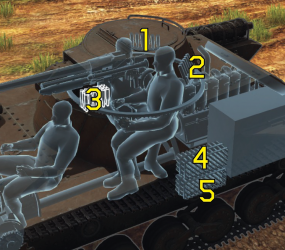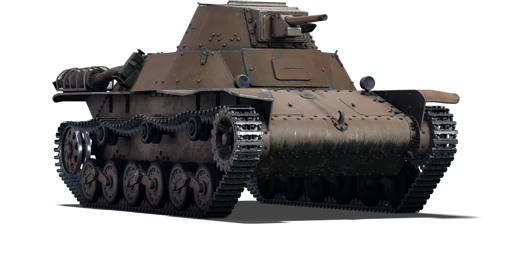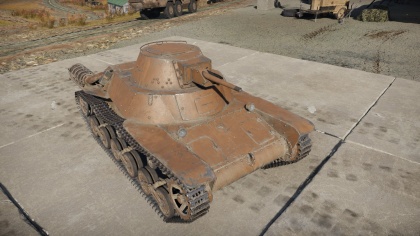Difference between revisions of "Ke-Ni"
(→History: Readded section description as comments) |
(→Usage in the battles) |
||
| Line 206: | Line 206: | ||
<!--''Describe the tactics of playing in the vehicle, the features of using vehicles in the team and advice on tactics. Refrain from creating a "guide" - do not impose a single point of view but give the reader food for thought. Describe the most dangerous enemies and give recommendations on fighting them. If necessary, note the specifics of the game in different modes (AB, RB, SB).''--> | <!--''Describe the tactics of playing in the vehicle, the features of using vehicles in the team and advice on tactics. Refrain from creating a "guide" - do not impose a single point of view but give the reader food for thought. Describe the most dangerous enemies and give recommendations on fighting them. If necessary, note the specifics of the game in different modes (AB, RB, SB).''--> | ||
Being a light tank, the Ke-Ni cannot engage enemies head-on. To succeed in an assault, you should flank or surprise the enemy. Never linger for too long in an open field since anything can kill you with ease. Use your good gun depression to keep an hull-down position behind hills and just pop out to shoot. | Being a light tank, the Ke-Ni cannot engage enemies head-on. To succeed in an assault, you should flank or surprise the enemy. Never linger for too long in an open field since anything can kill you with ease. Use your good gun depression to keep an hull-down position behind hills and just pop out to shoot. | ||
| + | |||
| + | ===Modules=== | ||
| + | {| class="wikitable" | ||
| + | ! Tier | ||
| + | ! colspan="2" |Mobility | ||
| + | ! Protection | ||
| + | ! colspan="3" |Firepower | ||
| + | |- | ||
| + | | I | ||
| + | | Tracks|| | ||
| + | | Parts | ||
| + | | Horizontal Drive | ||
| + | |- | ||
| + | | II | ||
| + | | Suspension||Brake System | ||
| + | | FPE | ||
| + | | Adjustment of Fire | ||
| + | |- | ||
| + | | III | ||
| + | | Filters|| | ||
| + | | Crew Replenishment | ||
| + | | Elevation Mechanism | ||
| + | |- | ||
| + | | IV | ||
| + | | Transmission||Engine | ||
| + | | | ||
| + | | Artillery Support | ||
| + | |- | ||
| + | |} | ||
=== Pros and cons === | === Pros and cons === | ||
Revision as of 19:28, 18 October 2019
Contents
Description
The Type 98 Ke-Ni is a reserve Rank Japanese light tank
with a battle rating of (AB), (RB), and (SB). It was introduced along with the entire Japanese Ground Forces tree in Update 1.65 "Way of the Samurai". Shooting the same ammo as the Ha-Go from a better cannon and using the same chassis as the Ta-Se, this tank is a fair deal at rank I. It's definitely a good tank for beginners.
Survivability:
With around 12 mm of armour all around, this tank is barely bullet proof. German and British machine guns can even knock you down at point-blank range (13 mm of max pen). You crew is cramped and not numerous, which makes surviving a shot really unlikely. This is definitely not the tank to expose to any kind of shots. With its small turret, hull-down positions are efficient with this tank.
Mobility:
Sharing the Ta-Se's chassis, this tank is quite fast and can achieve surprising feats of mobility. Coupled with a god turret traverse speed, this tank can be reliably used in flanking manoeuvres. With its narrow tracks and good HP ratio, this tank is fast on almost any ground but easily looses speed on rough terrain or steep hills. Another good characteristic from this tank is its reverse speed of -7 km/h that allow it to effectively use peek-a-boo tactics.
Firepower:
Sharing the Ha-Go's ammunition but increasing its velocity, this tank offers a good learning curve from its predecessor. Even if this cannons does not have the best penetration at rank I, is has a good amount of HE filler in order to ensure that each penetrating shot deals damage. This gun only has one type of ammo but this is compensated by the presence of a coaxial MG, which can deal with unarmored targets often found at this BR.
General info
Survivability and armour
Armour type:
- Rolled homogeneous armour
| Armour | Front | Sides | Rear | Roof |
|---|---|---|---|---|
| Hull | 12 + 10 mm (20-27°) Front plate 12 mm (71°) Front glacis 12 mm (2-58°) Lower glacis |
12 mm (29-34°) Top 12 mm Bottom |
10 mm (52°) Top 10 mm (12-52°) Bottom |
10 mm |
| Turret | 12 mm (0-81°) Turret front 16 mm Gun mantlet |
12 mm (25°) | 12 mm (25°) 10 mm (24-25°) Rear door |
9 mm |
Notes:
- Suspension wheels and tracks are both 15 mm thick.
Mobility
| Mobility characteristic | ||
|---|---|---|
| Weight (tons) | Add-on Armour weight (tons) |
Max speed (km/h) |
| 7.2 | N/A | 50 (AB) |
| 45 (RB/SB) | ||
| Engine power (horsepower) | ||
| Mode | Stock | Upgraded |
| Arcade | 141 | 173 |
| Realistic/Simulator | 115 | 130 |
| Power-to-weight ratio (hp/ton) | ||
| Mode | Stock | Upgraded |
| Arcade | 19.58 | 24.03 |
| Realistic/Simulator | 15.75 | 18.05 |
Armaments
Main armament
| 37 mm Type 100 | |||||
|---|---|---|---|---|---|
| Capacity | Vertical guidance |
Horizontal guidance |
Stabilizer | ||
| 110 | -15°/+18° | ±180° | Vertical | ||
| Turret rotation speed (°/s) | |||||
| Mode | Stock | Upgraded | Prior + Full crew | Prior + Expert qualif. | Prior + Ace qualif. |
| Arcade | 16.18 | 22.40 | __.__ | 30.1 | 32.00 |
| Realistic | 10.12 | 11.90 | 14.5 | 16.0 | 17.00 |
| Reloading rate (seconds) | |||||
| Stock | Prior + Full crew | Prior + Expert qualif. | Prior + Ace qualif. | ||
| 4.29 | 3.8 | 3.5 | 3.30 | ||
Ammunition
| Penetration statistics | |||||||
|---|---|---|---|---|---|---|---|
| Ammunition | Type of warhead |
Penetration in mm @ 0° Angle of Attack | |||||
| 10m | 100m | 500m | 1000m | 1500m | 2000m | ||
| Type 94 APHE | APHE | 42 | 40 | 33 | 26 | 20 | 15 |
| Shell details | ||||||||||
|---|---|---|---|---|---|---|---|---|---|---|
| Ammunition | Type of warhead |
Velocity in m/s |
Projectile Mass in kg |
Fuse delay
in m: |
Fuse sensitivity
in mm: |
Explosive Mass in g (TNT equivalent): |
Normalization At 30° from horizontal: |
Ricochet: | ||
| 0% | 50% | 100% | ||||||||
| Type 94 APHE | APHE | 700 | 0.67 | 1.3 | 15 | 13 | 47° | 60° | 65° | |
Ammo racks

| Full ammo |
1st rack empty |
2nd rack empty |
3rd rack empty |
4th rack empty |
5th rack empty |
Visual discrepancy |
|---|---|---|---|---|---|---|
| 110 | 105 (+5) | 99 (+11) | 81 (+29) | 41 (+69) | 1 (+109) | No |
Only left side: 81 (+29)
Machine guns
| 7.7 mm Type 97 | ||||||
|---|---|---|---|---|---|---|
| Coaxial mount | ||||||
| Capacity (Belt capacity) | Fire rate (shots/minute) |
Vertical guidance |
Horizontal guidance | |||
| 3,000 (20) | 499 | N/A | N/A | |||
Usage in the battles
Being a light tank, the Ke-Ni cannot engage enemies head-on. To succeed in an assault, you should flank or surprise the enemy. Never linger for too long in an open field since anything can kill you with ease. Use your good gun depression to keep an hull-down position behind hills and just pop out to shoot.
Modules
| Tier | Mobility | Protection | Firepower | |||
|---|---|---|---|---|---|---|
| I | Tracks | Parts | Horizontal Drive | |||
| II | Suspension | Brake System | FPE | Adjustment of Fire | ||
| III | Filters | Crew Replenishment | Elevation Mechanism | |||
| IV | Transmission | Engine | Artillery Support | |||
Pros and cons
Pros:
- Low profile tank.
- Slightly improved 37 mm cannon compared to the Ha-Go, able to penetrate the majority of rank 1.
- Coaxial Type 97 machine gun (Japanese early tanks rarely have this feature).
- Big ammo load.
- Good reload time.
- Small ammo racks.
- Small engine: hard to hit from the front.
- Good turret traverse.
- -15° of depression.
- Has lock, which is a primitive form of vertical stabiliser.
- Decent reverse speed (-7 km/h).
Cons:
- Armour is rather thin as a light tank.
- Only one ammunition choice, can have difficulty dealing with heavily armored tanks.
- Only 3 crew.
- Crew is cramped.
- Hard to angle due to the shape of the armour.
History
A replacement for the Ha-Go light tank, 104 of the Type 98 Ke-Ni were built between 1942 and 1943. They were retained for home defence and did not see combat.
Media
An excellent addition to the article will be video guides, as well as screenshots from the game and photos.
Read also
Links to the articles on the War Thunder Wiki that you think will be useful for the reader, for example,
- reference to the series of the vehicles;
- links to approximate analogues of other nations and research trees.
ETC.
Sources
Paste links to sources and external resources, such as:
- topic on the official game forum;
- other literature.
| Japan light tanks | |
|---|---|
| Type 89 | I-Go Ko |
| Type 95 | Ha-Go · Ha-Go Commander |
| Type 98 | Ke-Ni |
| Other | Ka-Mi |
| IFV | Type 89 |
| RCV | Type 87 RCV (P) · Type 87 RCV · RCV (P) |
| MCV | Type 16 (P) · Type 16 (FPS) · Type 16 |
| USA | ▅M24 · ▅M41A1 |





